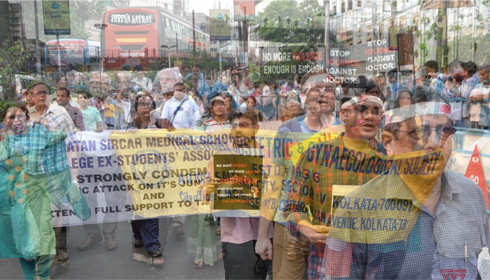
Junior Doctors Challenge State over Accountability in RG Kar Case
The brutal torture and murder of a medical student at RG Kar Medical College precipitated the current protest by junior doctors in West Bengal, raising serious concerns about the handling of the probe. Despite intense protests and demands for accountability, the state government has refused to take action against the health department officials and police officers accused of destroying evidence and providing false information to the media.
This has exacerbated the conflict between junior doctors and the administration, sparking political disputes over the underlying motivations behind these demands.
The junior doctors have been on strike since August 9, stating five fundamental demands, the most pressing of which is the identification and punishment of all individuals involved in the RG Kar case.
They have also demanded action against health department officials and police officers who tampered with evidence. The doctors claim that the postmortem was performed under questionable conditions, including the loss of critical evidence caused by demolishing the bathroom wall adjacent to seminar room where the victim's body was discovered.
The junior doctors asked in a public statement, "Why shouldn't the health department officials who were hand in glove in destroying critical evidence face consequences?" Why shouldn't we hold accountable the police officers who misled the media? They also questioned the lack of attention paid to these flaws, given the seriousness of the incident.
However, the state government has denied these demands, with Chandrima Bhattacharya, Minister in charge of Health accusing junior physicians of politicising the matter. "They are not approaching this with an open mind," Bhattacharya said at a press conference, blaming the doctors' refusal to negotiate on political considerations. The junior doctors, on the other hand, have stated that their strike is purely apolitical, with the goal of obtaining justice for their colleague and improving the safety of healthcare professionals across the state.
The current stalemate took a new turn when the physicians sought a meeting with 30 delegates, demanding that Chief Minister Mamata Banerjee and the health minister attend. They also requested a live broadcast of the meeting, expressing their deep mistrust towards the administration.
The junior doctors' requests centre on the allegation of evidence manipulation. According to the protesting doctors, not only was Sandip Ghosh, the former principal of RG Kar Medical College, engaged in the destruction of evidence, but so were senior health department officials. The Central Bureau of Investigation (CBI), which has taken over the case, has expressed similar concerns, claiming that the bathroom wall was purposely smashed to conceal the crime.
The junior doctors statted that the top officials in the health building are responsible for not only the destruction of evidence but also for rampant corruption in the state's health system. They contend that the lack of accountability at the highest levels of administration represents a broader problem with healthcare governance in West Bengal.
The junior doctors’ requests have prompted political controversy, with opposition parties, particularly the Bharatiya Janata Party (BJP), using the issue to criticise the state government. BJP politician Agnimitra Paul expressed her support for the protests, urging urgent action against those involved for tampering with evidence. The ruling Trinamool Congress (TMC) has accused the protests of being political in nature.
According to Chandrima Bhattacharya, the junior doctors’ insistence on meeting specified discussion criteria, such as live broadcasts of meetings, suggests a political intent. She asserted that the state administration, while still committed to ensuring the safety of healthcare workers, is unable to participate in discussions regarding these circumstances.
As the strike enters its second month, the impact on the healthcare system grows more severe. Junior doctors have an important role in overseeing patient care, particularly in Kolkata's five major hospitals, which serve patients from all across the state. With roughly 7,000 junior doctors on strike, senior doctors are struggling to handle the influx of patients, causing severe delays in medical services.
Health Minister Chandrima Bhattacharya has urged junior doctors to return to work and remember their patients' pain. "The common people are suffering," she stated. "We are committed to ensuring your safety at work, but we cannot allow this strike to continue indefinitely."
Despite these pleadings, the junior doctors are unwavering in their demands. They believe that the state government's unwillingness to take action against individuals responsible for tampering with evidence and spreading falsehoods demonstrates a lack of commitment to justice. "We are not doing politics," one woman demonstrator stated. “However, our return to work is contingent on fulfilling our demands for justice,” she added.
With the state administration refusing to take action against important officials and the junior doctors refusing to back down, the standoff shows no indications of ending in the coming days. As the strike continues, experts anticipate an increase in the political aspect of the protests, prompting questions about healthcare professionals' involvement in political disputes and the future of healthcare governance in West Bengal.